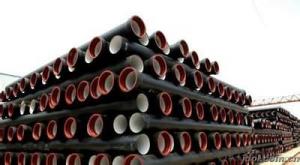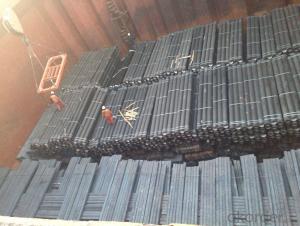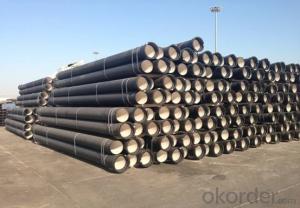DUCTILE IRON PIPE K8 DN1100
- Loading Port:
- China Main Port
- Payment Terms:
- TT OR LC
- Min Order Qty:
- -
- Supply Capability:
- -
OKorder Service Pledge
OKorder Financial Service
You Might Also Like
Ductile Iron Cast Pipe is without any defects compare with tradition casting tech, which has many advantages particularly as follow:
(1) High density. In the "vertical upward casting" process, the melt iron of centre liquid column in center crystallizer is continuously feeding for volume shrinkage caused by condensation tube at outer circumference , which lead to be free of shrinkage porosity.
(2) High purity. When melt iron pouring, the mixed impurities such as gas, dross, sand grain which are lighter than melt iron could be eliminated at furnace mouth, its impossible to enter into the crystallizer through the channel, so the melt iron into the crystallizer is very pure.
(3) Strength with toughness. The cooling speed provided by continuous crystallizer is 30 times than sand casting and 5 times than centrifugal casting, and doesn't produce white iron, the eutectic cell volume of continuous cast iron is one eighth to one tenth compare with traditional cast iron. The density of graphite nodule in ductile iron can reach 300-700 pcs/mm2. Therefore, all reason above improve the strength and toughness of continuous cast iron.
(4) Free machining. The high speed cooling make the hardening phase (such as boride, steadite) not appear like reticular, massive or thick, but diffuse like fish bone and pane in shape, moreover, there are tiny graphite flakes inlaid hardening phase. It's free machining in BrinellHardness the range of 250-300HB. However, the Brinell Hardness of 250 is top limit to common metal materials.
(5) Uniform composition of tube wall. The convection mixing of liquid column caused by marching type drawing in crystallizer make the composition of tube wall well-distributed, and concentration gradient very little.
(6) High productivity. To the wall thickness of tube under 10mm, the speed of continuous casting is 1 meter/min, to the wall thickness of tube under 20mm, the speed of continuous casting is 0.5 meter/min, which is high efficiency that centrifugal or other casting tech couldn't reach.
- Q:How much pressure can the ductile iron pipe socket meet?
- If it is a general installation, you can rest assured, are within the scope of tolerance.
- Q:Can ductile iron pipes be used for above-ground installations?
- Ductile iron pipes are capable of being utilized for installations above the ground. Ductile iron, a form of cast iron, possesses enhanced tensile strength and flexibility, rendering it appropriate for a wide range of applications, including installations above the ground. It is commonly employed in water distribution systems, sewage systems, and industrial pipelines. Ductile iron pipes exhibit resistance to corrosion, can endure high pressure and temperature, and boast an extended lifespan. They are additionally accessible in various sizes and can be effortlessly linked using diverse types of joints. However, it is imperative to guarantee adequate support and safeguard against external elements like sunlight and impact to avert any potential harm.
- Q:Is the ambient temperature at minus 20 degrees better with grey cast iron or ductile iron?
- Ductile iron castings have been used in almost all major industries. These departments require high strength, plasticity, toughness, wear resistance, and resistance to ductile iron
- Q:Are ductile iron pipes suitable for use in cold climates?
- Yes, ductile iron pipes are suitable for use in cold climates. Ductile iron is known for its excellent strength and durability, making it a reliable choice for various applications, including water supply systems, sewage systems, and industrial piping. In cold climates, where temperatures can drop below freezing, ductile iron pipes are highly resistant to cracking or breaking due to their unique metallurgical composition and structure. They have a high tensile strength and can withstand the expansion and contraction caused by freezing and thawing cycles. Additionally, ductile iron pipes have a smooth internal surface that helps prevent the buildup of ice or sediment, ensuring efficient flow and minimizing the risk of blockages. Overall, ductile iron pipes are a suitable and dependable option for use in cold climates.
- Q:How does ductile iron pipe perform in areas with high groundwater levels?
- Ductile iron pipe proves to be highly effective in areas characterized by elevated groundwater levels. A notable advantage of this type of pipe lies in its resistance to corrosion, rendering it particularly suitable for underground applications and areas with high water tables. Unlike alternative materials, ductile iron pipe remains impervious to rust or corrosion caused by groundwater, ensuring its longevity and durability. Moreover, ductile iron pipe is distinguished by its exceptional strength and flexibility, enabling it to withstand the external pressure exerted by high groundwater levels. It effectively resists the buoyant forces exerted by water, thereby preventing any displacement or flotation. Furthermore, the joints of ductile iron pipe are tightly sealed, thus preventing any infiltration of groundwater into the pipe system. This guarantees the absence of leaks or water supply contamination, which is of utmost importance in areas with high groundwater levels. All in all, ductile iron pipe emerges as the optimal choice for areas with high groundwater levels due to its corrosion resistance, strength, and ability to maintain a secure and tightly sealed system. It provides a dependable and long-lasting solution for water distribution and sewer systems, even in challenging environments.
- Q:How does ductile iron pipe perform in seismic conditions?
- Ductile iron pipe has excellent performance in seismic conditions due to its inherent flexibility and strength. It can withstand ground movements and vibrations caused by earthquakes without fracturing or breaking. Its ability to absorb and dissipate energy helps prevent catastrophic failures and ensures the integrity of the pipeline system. Additionally, ductile iron pipe's corrosion resistance and durability make it a reliable choice for long-term performance in seismic-prone areas.
- Q:Can ductile iron pipe be used for industrial applications?
- Yes, ductile iron pipe can be used for industrial applications. Ductile iron pipe is known for its strength, durability, and flexibility, making it suitable for a wide range of industrial settings. It is commonly used for transporting water, wastewater, and other fluids in industrial facilities such as power plants, chemical plants, refineries, and manufacturing plants. Ductile iron pipe is resistant to corrosion, which is important in industrial environments where the pipes may be exposed to chemicals, high temperatures, or abrasive materials. Additionally, its high tensile strength allows it to withstand high-pressure applications, making it ideal for industrial use. Overall, ductile iron pipe is a reliable and cost-effective choice for various industrial applications.
- Q:Can ductile iron pipes be used for underground storage tanks?
- Under specific circumstances, ductile iron pipes are appropriate for underground storage tanks. This material possesses strength and durability, effectively resisting corrosion and making it a suitable option for underground applications. Nevertheless, several factors must be taken into account before implementing ductile iron pipes for underground storage tanks. First and foremost, it is vital to evaluate the project's precise demands and regulations. Different regions and industries may enforce specific guidelines regarding the materials used in underground storage tanks. It is imperative to ascertain that ductile iron pipes comply with these regulations and meet the required standards for underground storage. Secondly, the size and capacity of the storage tank must be considered. Ductile iron pipes are available in various sizes, but their dimensions may not be suitable for large-scale storage tanks due to limitations. Consulting engineers or experts is necessary to determine the appropriate pipe size and capacity for the specific storage requirements. Lastly, the design and installation of the underground storage tank necessitate careful planning. Adequate measures should be taken to seal and protect against external factors such as soil movements, water pressure, or other potential hazards. Preventive actions should be implemented to avoid leaks or damage to the pipes, ensuring the safety and longevity of the storage tank. In conclusion, ductile iron pipes can be utilized for underground storage tanks, but it is crucial to consider the specific requirements, regulations, sizing limitations, and proper design and installation. Seeking guidance from professionals in the field and adhering to industry standards will ensure successful implementation of ductile iron pipes for underground storage tanks.
- Q:Are there any special considerations for installing ductile iron pipe in rocky soils?
- Yes, there are several special considerations for installing ductile iron pipe in rocky soils. Firstly, the rocky soil can pose challenges during the excavation process. The presence of rocks can increase the difficulty and time required for trenching. Special excavation equipment may be needed to break through the rocks and create a suitable trench for the pipe installation. Secondly, the rocky soil can cause abrasion and damage to the outer surface of the ductile iron pipe during installation. This can potentially compromise the integrity of the pipe and lead to leaks or breakages in the future. To mitigate this risk, it is recommended to use protective measures such as rock shields or padding around the pipe to minimize direct contact with the rocks. Additionally, the presence of rocks can affect the backfilling process. Proper backfilling is crucial to provide support and stability to the installed pipe. However, rocks can hinder the proper compaction of the backfill material, which may result in uneven support and potential movement of the pipe. It is important to carefully select and place the backfill material, ensuring it is free from larger rocks and adequately compacted to provide sufficient support. Furthermore, the rocky soil may also impact the installation of fittings and joints. The hard rocks can make it challenging to properly align and connect the pipe with fittings or make secure joints. Special care must be taken during the installation process to ensure proper alignment and secure connections, which will prevent leaks and ensure the longevity of the ductile iron pipe system. In conclusion, installing ductile iron pipe in rocky soils requires special considerations to overcome challenges related to excavation, abrasion, backfilling, and fitting installation. By taking these factors into account and implementing appropriate measures, the installation process can be successfully carried out, and the pipe system can function effectively in rocky soil conditions.
- Q:Can centrifugal cast iron pipe be galvanized or coated with asphalt which is good for corrosion prevention?
- The centrifugal ductile iron pipe has the advantages of zinc coating and asphalt coating, and it is used in combination with two. By spraying zinc and epoxy coal tar coating of ductile iron pipe wall (or epoxy resin paint, polyurethane, etc.) wall using Portland cement (or epoxy powder, epoxy, polyurethane, ceramics etc.) wall coating can effectively active substances in soil and the formation of an insoluble zinc salt protection tube, the internal coating can inhibit corrosion of pipe body fluid medium.
1. Manufacturer Overview |
|
|---|---|
| Location | |
| Year Established | |
| Annual Output Value | |
| Main Markets | |
| Company Certifications | |
2. Manufacturer Certificates |
|
|---|---|
| a) Certification Name | |
| Range | |
| Reference | |
| Validity Period | |
3. Manufacturer Capability |
|
|---|---|
| a)Trade Capacity | |
| Nearest Port | |
| Export Percentage | |
| No.of Employees in Trade Department | |
| Language Spoken: | |
| b)Factory Information | |
| Factory Size: | |
| No. of Production Lines | |
| Contract Manufacturing | |
| Product Price Range | |
Send your message to us
DUCTILE IRON PIPE K8 DN1100
- Loading Port:
- China Main Port
- Payment Terms:
- TT OR LC
- Min Order Qty:
- -
- Supply Capability:
- -
OKorder Service Pledge
OKorder Financial Service
Similar products
New products
Hot products
Related keywords




























